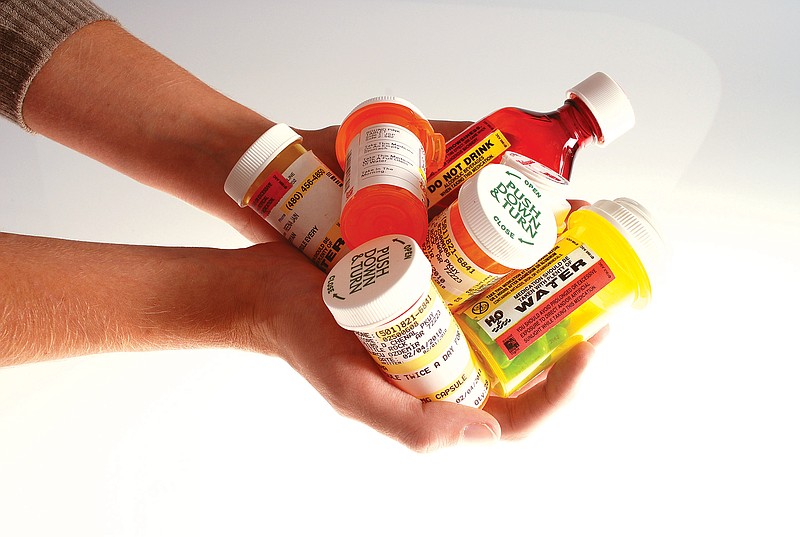TRI-LAKES AREA — Millions of doses of prescription drugs, many of them controlled substances, are not securely guarded and are vulnerable to theft and misuse, according to the Drug Enforcement Administration. Those valuable and unguarded drugs can be found in most homes in America, including those in Arkansas.
The DEA is partnering with law-enforcement agencies, local governments and community organizations for the National Drug Take-Back Initiative from 10 a.m. until 2 p.m. Saturday.
Unused prescription drugs will be collected at 200 sites in Arkansas, managed by 180 local police departments, sheriff’s offices and other law-enforcement agencies, Benton Police Chief Kirk Lane said.
“Arkansas’ take-back effort is the fifth largest in the nation,” he said during a briefing Monday for Saline County’s drug-collection campaign. “In our district — that includes this state and the surrounding states — Arkansas is No. 1 in the size and scope of their efforts to collect prescription drugs.”
Lane said there will be eight collection sites in Saline County, involving all the law-enforcement agencies, with help from the Arkansas State Police and other groups.
Helping with the efforts will be pharmacy students from the University of Arkansas for Medical Sciences in Little Rock and Saline County pharmacists, Lane said. Also playing a support role will be volunteers from local health agencies and drug-awareness groups, the chief said.
“This is the first national DEA-sponsored event like this,” said Steve Varady, policy coordinator for the Arkansas Office of Drug Director and the statewide organizer for the event. “Other communities have hosted take-back events on their own. It is possible that we could have millions (of drug doses) returned nationwide.”
Varady pointed out that Benton’s drug-take-back event Operation Medicine Cabinet, held earlier in the year, collected 53,000 pills, with one-third of those being controlled substances.
Prescription drug abuse is a growing concern in this country, especially among young people, Varady said. Studies by the U.S. Department of Justice state that the majority of the abused drugs are being taken from medicine cabinets, Varady said in Benton in an earlier briefing for Saturday’s collection operation.
Drugs can be taken in a burglary but are most often taken by someone with access to the drug owner’s medicine cabinet, Lane said. Often children or grandchildren, or their friends, are the culprits, the chief added during an announcement last month about the national drug take-back program.
Medications must be disposed of properly to prevent them from getting into the wrong hands. When drugs are flushed down toilets, water-treatment plants cannot remove some of the active chemicals found in drugs. Studies have found that those chemicals remain in the water and can cause harm to fish and other wildlife, and can even be found in the drinking-water supply.
“A lot of folks just don’t know what to do with their old pills and medicines,” Varady said. “Flushing is not the answer. The take-back is a legal and environmentally friendly means of disposing of the drugs and keeping them out of kids’ hands.”
Drug collection centers will be available throughout the region. The Hot Springs Police Department and the Garland County Sheriff’s Office will accept drugs at the sheriff’s headquarters on Ouachita Avenue in Hot Springs. Malvern police will have a collection center at the Walmart Supercenter in their city. In Arkadelphia, medications can be taken to the Clark County Sheriff’s Office, and the Arkadelphia Police Department will collect drugs at the Arkadelphia Recreation Center.
Some collection centers will accept only solid dosage medication, such as pills and tablets, while others will accept liquid medicines as well. Chief Lane said the collection center in Benton will have the equipment needed to accept needles and other sharps, while most locations will be unable to take intravenous medications or needles.
Lane said law-enforcement agencies will inventory the drugs they have collected. Drugs that have been taken back around the county will be delivered to the State Police Troop headquarters. The National Guard will collect the drugs around the state and, in a guarded convoy, transport them to Clean Harbors Environmental Services in El Dorado, where the drugs will be incinerated.
Lane said that while the drug take-back effort will remove some unwanted medications, the event’s main purpose is public education about the dangers of prescription drugs.
The goal of the program, he said, will be permanent drug disposal locations overseen by local law-enforcement agencies. The Benton Police Department has a drug drop box in the front door of police headquarters on the lower level of the Benton Municipal Center, 114 S. East St.
Another goal is statewide legislation to monitor prescription-drug use. Lane said Arkansas is one of only five states without monitoring programs that track prescriptions for controlled substances.
“If a person gets a prescription for, say, OxyContin, the person might be able to get the same prescription from three or four doctors,” Lain said. “Then they could fill each of them at four or five pharmacies without anyone being aware of the problem.”
The legislation will create a database to uncover that kind of fraud, Lane said. The chief said he is confident that a bill creating the program will be passed in the new session of the Arkansas Legislature.
Later this year, Lane will go to Washington, D.C., to address a meeting of the National Alliance of Model Drug Laws, a resource group for state governors, legislatures and attorneys general on drug and alcohol policies and laws.
